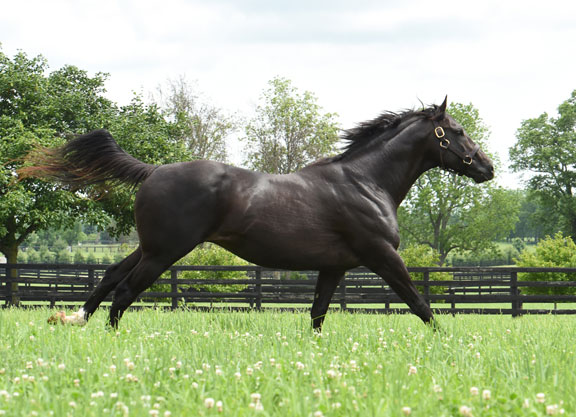There has been a lot of conversation in these pages over the past few days about the difficulty sires have attracting mares in their third and fourth season. Many of them are sold overseas as a result. Once in a while, one gets off to such a good start in America that they are brought back when it is discovered that people simply gave up on them too soon.
Case in point: Take Charge Indy.
The son of A.P. Indy is back at WinStar Farm after spending three years in Korea. The syndicate that owned him made the decision to sell him before any of his offspring had made it to the races, accepting an offer from the Korean Racing Authority.
“Selling Take Charge Indy was one of the toughest decisions I've had to make in my time as a syndicate manager, but, ultimately, we have to blend the passion we have for our horses with business principles for our shareholders,” WinStar President & CEO Elliott Walden said at the time. “Sometimes, difficult decisions like this arise for that philosophy. The KRA has had strong interest in the horse, and they simply made an offer that was too good to turn down.”
It seemed at the time like a sound business decision. The market is fickle and everyone is looking for a “shiny new toy” and not for those stallions that have been around for a few years and come off the track without a lot of fanfare. No fault of his own, but Take Charge Indy had become a tough sell.
“People were doubters when his first foals hit the ground and when they saw his first yearlings,” said Sean Tugel, the director of bloodstock services and assistant racing manager for WinStar. “Unfortunately, the commercial marketplace is what dictates a lot of our decisions here in America.”
The true test of a sire does not come until their horses start racing. The commercial marketplace had been wrong about Take Charge Indy. His first three crops included GII Rebel S. winner and GI Kentucky Derby starter Long Range Toddy, GII Louisiana Derby winner Noble Indy, GIII Forward Gal S. winner Take Charge Paula and four-time stakes winner Split Time. In 2018, he was the second-leading second-crop sire behind Violence. In 2019, he was the leading third-crop sire with progeny earnings of more than $4.4 million. Obviously, he had what it takes to be a commercially successful sire in Kentucky.
“He proved all of us wrong,” Tugel said. “He proved us all wrong with his first crop of 2-year-olds, he went on to be leading third crop sire in America last year and he continues on.”
Fortunately, the syndicate that owned Take Charge Indy inserted clauses into the contract with the Korean Racing Authority that allowed it to bring the horse back to Kentucky either after he had stood two or three years in Korea.
No one at WinStar was that surprised that Take Charge Indy got off to a fast start as a sire here. By A.P. Indy out of Take Charge Lady, a winner of three Grade I races, he had an impeccable pedigree and was, himself, a top racehorse. Trained by Pat Byrne and owned at the time by Chuck and Maribeth Sanford, he won the 2012 GI Florida Derby, which earned him a start in the Kentucky Derby. As a 4-year-old, he romped in the GII Alysheba S. at Churchill Downs, winning by six lengths.
“He was a horse that we knew would fit our barn and what we look for–that dominant, American dirt type of horse,” Tugel said. “We bought into him during his 3-year-old season, then we raced him with the Sanfords as a 4-year-old and he went on to win the Alysheba very impressively on Derby Day. He came into the stallion barn with very high credentials.”
Soon after the first crop by Take Charge Indy started to hit the racetrack, WinStar began to consider bringing him home.
“As soon as his first 2-year-olds came out, we were already starting to look at the dates and when we had to exercise the clause to bring him back.” Tugel said. “We were very close to bringing him back after he was gone for two years. It was something that we had to discuss with the syndicate because people had to vote to bring him back and had to reinvest in him. In year three, when he had extended success and we knew that he would be a horse that deserved to come back to America, we went and brought him back.”
Take Charge Indy's Korean offspring have yet to hit the racetrack, but Tugel said the stallion was in high demand there.
“He bred large crops for three years while he was in Korea,” he said. “He bred over a hundred mares all three years there. They were very disappointed to see the horse leave.”
He did leave something behind in Korea–part of his tail. It seems that he was paired with a goat in Korea, a mischievous goat that took a chunk out of his tail.
WinStar announced in September that Take Charge Indy was returning for the 2020 breeding season. His stud fee is $17,500. Tugel said that WinStar has been delighted by the demand shown for the stallion.
“He's come back to America and he's been very well supported with the people that have wanted to breed to him,” he said. “For $17,500 you're getting a proven horse with a very good pedigree. He's a horse that people are swarming for this year.”
Tugel said that Take Charge Indy settled right in when arriving back at WinStar and “hasn't missed a beat.” He's back in Kentucky, this time, no doubt, for good.
Not a subscriber? Click here to sign up for the daily PDF or alerts.






